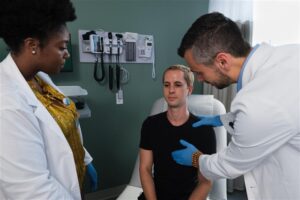Division, Disparity, and Disregard for Human Rights has Led to Increased HIV Cases-Trans Nzoia Deputy governor

Trans Nzoia Deputy governor Dr. Stanley Tarus has attributed division, disparity, and disregard for human rights as some of the factors that have allowed HIV to become and remain a global health crisis.
Speaking today in Kitale as the world commemorates World AIDS Day, he said the event is an opportunity to support those involved in the fight against HIV and to improve understanding of HIV as a global public health problem.
The deputy county chief said COVID-19 is exacerbating inequalities and disruption to services, making the lives of many people living with HIV more challenging.
“Forty years since the first AIDS cases were reported, HIV still threatens the world. Today, the world is off-track delivering on the shared commitment to end AIDS by 2030, not because of a lack of knowledge or tools to beat AIDS, but because of structural inequalities that obstruct proven solutions to HIV prevention and treatment,” he added.
He said the world should move with speed and address the issues that have been pulling behind the fight against HIV/AIDS saying to tackle inequalities there should be equitable access to medicine, vaccines, and health technologies to all.
He added that essential health workers should be elevated and provided with the required resources and tools they need and also the infrastructure should be community-led and people-centered.
“The fight against this pandemic will only be successful if the issue of human rights is addressed as this would ensure there is trust and also we must have a people-centered data system that highlights inequalities as this will enable us to know exactly where we are going,” said Dr. Tarus.
The theme of World AIDS Day 2021 is “ End inequalities . End AIDS . End pandemics”. With a special focus on reaching people left behind, WHO and its partners are highlighting the growing inequalities in access to essential HIV services.
The theme in Kenya for marking World Aids Day 2021 is “ End teenage pregnancies towards eliminating inequalities and new HIV infections” “Komesha mimba za Utotoni”,
The deputy governor said the Aim is to address the alarming increase in teenage pregnancies during the covid-19 lockdown and restrictive period.
“Teenagers are more vulnerable to getting HIV infections than older people, hence reduction of risky sexual behavior which leads to pregnancies for which many are unprepared also puts them at risks for contracting HIV infection. Prep and PEP are available to mitigate against contracting HIV, but many teenagers do not come for this assistance and when they do come for testing is too late for prevention,” he said
He cautioned residents to be aware of all the risks that accompany sexual intercourse.
On her part, the County health CEC Claire Wanyama observed that the objective of the event is to communicate the importance of equitable access to health services and the importance of strengthening actions at the primary health care level, with special emphasis on HIV combining prevention and treatment services as well as promoting work with communities to reach the people most vulnerable to HIV and other pandemics.
In Trans Nzoia , said the CEC, 40 out of 100 people of ANC mothers are teenagers and with an HIV prevalence of 4.1 percent, adolescents living with HIV are 1616 and in 2020 new HIV infections among adolescents were 125. All this is from a total adult population of 27610 people living with HIV.
She said the COVID-19 pandemic has clearly shown the importance of transforming the health system to provide health services based on primary care, guarantee universal access to health, and ensure a multisectoral commitment to eliminating this disease.
She observed that innovative strategies such as multimonth drug dispensing and new community-led care models have helped maintain HIV services during COVID-19. Noting, however, that there has been a decrease in the diagnosis of people living with HIV, as well as delays in implementing PrEP.
While reiterating the county government’s commitment to addressing the matter, the CEC said community-based service must be strengthened and provided with enough funding to be the frontline in the battle against stigmatization, with human rights and the center of the pandemic response.
“It’s recommended that people at risk of contracting HIV be tested and referred to care and treatment services if they test positive. It is important to work together to increase the demand for HIV-related services in vulnerable populations, and to update HIV testing programs and services by promoting self strategies” she added.
The CEC said CoVID-19 vaccination should reach people living with HIV as a part of national vaccination programs.
She said that HIV programs must build on the gains made so far and move towards the 95-95-95 targets by 2025, as defined in the new Global AIDS strategy.





